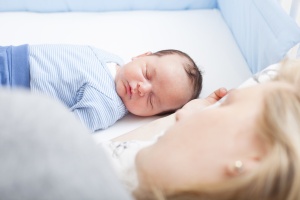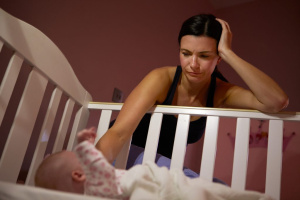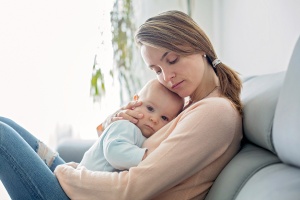One NCT member shares her experience of postnatal depression, and how she found help and mental balance with pregnancy and parenthood second-time around.
I’m the bubbly chatty one who’s first on the dance floor (stone sober) and loving life. I have good friends, a job, an MA, a fantastic husband and a lovely new home.
"I went through the motions of parenting but there was no bond."
I had it all but then everything changed when I became pregnant with my daughter in 2008. I hated being pregnant. I didn’t blossom and I didn’t glow. I hated the exhaustion of being a new mum. I often felt like I hated my daughter.
I went through the motions of parenting but there was no bond, no love lost, just a permanent sadness.
A cry for help
One day after screaming at my four month old when she wouldn’t go to sleep (like screaming really helped anyone to sleep); I visited the health visitor for a routine weigh in.
The best piece of advice I was ever given was that a baby doesn’t suffer from a parent temporarily stepping away from the crying, a baby suffers when the parent doesn’t step away. I still think of this now when I’m at my wits end.
Out of nowhere I said “I just want to stop feeling sad”. And that was the beginning of my journey towards the light at the end of the tunnel.
The health visitor visited me at home and asked me lots of questions. She said all the right things and reassured me that my daughter wouldn’t be taken away from me, as I wasn’t a danger to her.
Steps to feel better
My GP formally diagnosed that I had postnatal depression (PND) and I was prescribed anti-depressants, which was nearly as scary as being ill. It took me a month to start taking them.
I also had lots of counselling and got a place in a PND support group. It was a relief to find out that I wasn’t the only one who hated pregnancy or struggled with the early years of parenthood.
Time is a healer
My hubby wanted another baby from the start but I was clear that pigs would fly first (though the guilt about that was terrible).
"Time does make things better."
Time does make things better and my stance on having another child changed over the years – from unlikely to happen to maybe one day conceiving.
And, in 2015, I had my second child. By then it felt right to try again.
Doing things differently second-time round
My health visitor got to know me during my second pregnancy, so she could recognise any of the signs if I started experiencing PND again. This was a great safety blanket and made me feel secure.
Every woman will have her own triggers when it comes to mental health issues; mine were a lack of identity, low self-esteem, and the feeling of complete isolation.
Second-time round I shed the baby weight early on, got out in the fresh air which boosted my serotonin levels and tried to do positive things. For me, this included getting out of the house, taking control of decisions and talking to people on a daily basis.
The light at the end
On numerous occasions over the years I thought I was well again only to look back a year on and realise that I was still on my journey.
My second child has just turned one and my PND hasn’t come back. I’m beating the odds which were stacked against me.
I’ll continue to wonder if it will come back, but I now have hope rather than fear.
I have found that light at the end of the tunnel and it is my son. Who knew that getting pregnant again after a seven-year gap would be what actually made me well again?
Looking ahead
I’m currently figuring out what my role is other than being ‘mum’. I can’t afford to go back to work but this time I’m actually enjoying being a mum.
One day I’d like to work again but for now I keep putting one foot in front of the other and make the conscious decision not to be afraid anymore.
Further information
Our support line offers practical and emotional support with feeding your baby and general enquiries for parents, members and volunteers: 0300 330 0700.
You might find attending one of our NCT New Baby courses helpful as they give you the opportunity to explore different approaches to important parenting issues with a qualified group leader and other new parents in your area.
Make friends with other parents-to-be and new parents in your local area for support and friendship by seeing what NCT activities are happening nearby.
Mind, a leading mental health charity, provides information on a range of mental health topics including postnatal depression and has an infoline for support: 0300 123 3393.
#PNDHour is an online peer support group that runs every Wednesday at 8pm via the Twitter account @PNDandMe. Anyone can join in to discuss topics about antenatal and postnatal depression, such as self-care, medication and seeking help. It’s run by a mum called Rosey who also blogs about her own experiences with antenatal and postnatal depression, as well as raising awareness of perinatal mental illness, at PND and me.
Contact specialist organisations like PANDAS for more help and support with postnatal depression.








